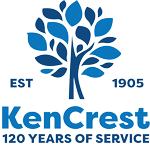
KenCrest’s Employment programs help to guide young adults transitioning from school to career by providing various resources and trainings.
By Sydney Kerelo
As a young adult with an intellectual and developmental disability (IDD), it can seem daunting to leave behind carefree childhood days and enter the adult world. Feelings of isolation or loss occur as each person leaves behind what’s familiar and pushes forward into the unknown.
But they don’t need to take that step alone. KenCrest’s School to Career and Employment programs provide various resources, training, and guidance to help those with an IDD navigate the working world.
“I have worked with my fair share of students that are very anxious about transitioning,” says former Job Coach and recent Assistive Technology Specialist Tyler MacReady. “It’s scary when you think about not being in school anymore and needing to be an adult with adult responsibilities. But what a lot of people don’t understand is that everybody has a first job. You don’t need to immediately find your forever career or what you will be doing for the next 40 years; you need to take your first step.”
KenCrest helps those with an IDD take that first step through programs like Project SEARCH, ACES, and even through the Pre-Employment Transition Supports (PRETS) through the Office of Rehabilitation (OVR).

Project SEARCH is a traditional internship model that provides nine months of classroom curriculum and onsite job training in conjunction with Phoenixville Hospital. While the Alternative Careers Education Supports (ACES) program offers third-party support for local school districts for those in the “bridge” or “transition” years (18-21) to assist them with developing and refining their soft skills when it comes to employment. And finally, in partnership with OVR, the PRETS program offers paid work experiences and job shadowing within a community-based business. Each employee receives 40 hours of work a week with an hourly stipend.
RELATED: Project SEARCH Prepares Young Adults for Employment
Plus, each program offers the opportunity to discover a person-centered approach to self-customized employment.
“We have many people who want to get a job, but they haven’t been exposed to a lot, and they don’t know their interests, talents, or even skills they possess,” says MacReady. “So, we have to take that person-centered approach and help discover what that person’s genius is, what they want to do, and how to get it.”
“It’s not about the money that’s important, but what you’re doing, where you’re going, and what community experience you are having,” adds MacReady.
Former associates of KenCrest’s employment program have gone on to work for various businesses like Normandy Farms, the Philadelphia School District, and Aramark.
One thing MacReady and the rest of the Employment department are working on is creating visual portfolios and video resumes that highlight the skillsets and passions of the people we support and to show employers how impactful each person will be to their business. And each business owner has discovered that opening their doors to people with varying abilities allows them to have long-lasting employees and ones with specific skills.

“The old adage is seeing is believing,” says MacReady. “There is only so much you can do to advocate for a person; sometimes you just need to let them advocate for themselves.”
With a diverse resume himself, MacReady understands the need for trial and error to find the perfect career fit. He’s worked for several businesses before finding the right one at KenCrest, including as a barista at a ski resort, Dunkin Donuts, as a bookkeeper for a hair salon, as a dispatcher for an appraisal company, and even working with the Department of Agriculture during the Spotted Lanternfly infestation.
Throughout his tumultuous career, MacReady has developed and acquired a hefty set of skills, including a love for technology, which prompted his recent switch to Enabling Technologies.
Shortly after he began working for Project SEARCH, MacReady discovered a digital coaching app called LifeSherpa to help his interns develop soft and hard skills while working on the job. The app allows a job coach to assign tasks and provide a library of resources for each intern.
Last year, one intern used the app to navigate the hospital halls, while another used it to learn how to wrap the wraps while working in the kitchen properly.
RELATED: LifeSherpa Supports Employment Growth
According to MacReady, it is a very versatile program that can assist those in employment and even those we support at home. The app can help them navigate their day-to-day interactions and assist them in accomplishing daily needs independently. Something they wouldn’t be able to do without the assistance of the app or a staff member.
Using technology like LifeSherpa allows the people we support to gain various skill sets and develop confidence in their abilities. So that when they move on to their next place of employment, they have a more substantial basis and can use the skills they learned to further their careers.
“I love the idea of using technology to help people lead more independent lives and having it let them self-direct what they want and where they want to go in life,” says MacReady. “It’s extremely rewarding, and I am excited to be a part of the Enabling Technology department and further my opportunity to help the people we support.”
Learn more about KenCrest’s Employment and Enabling Technology programs by clicking the links below.
